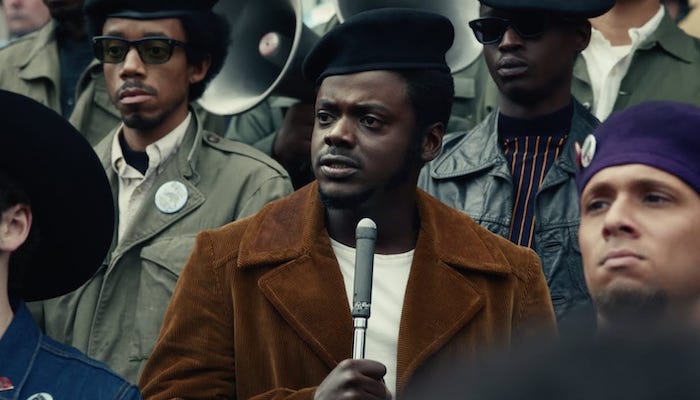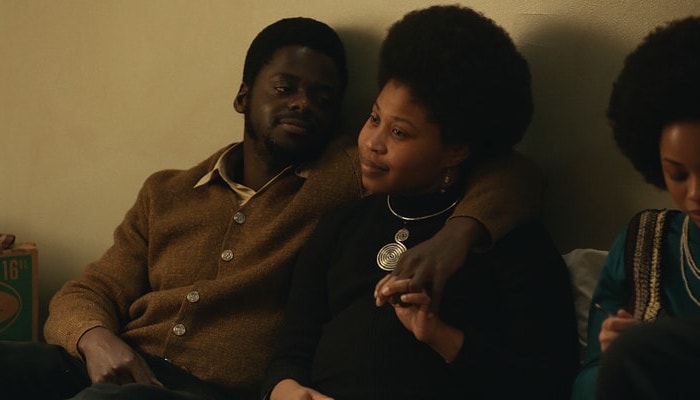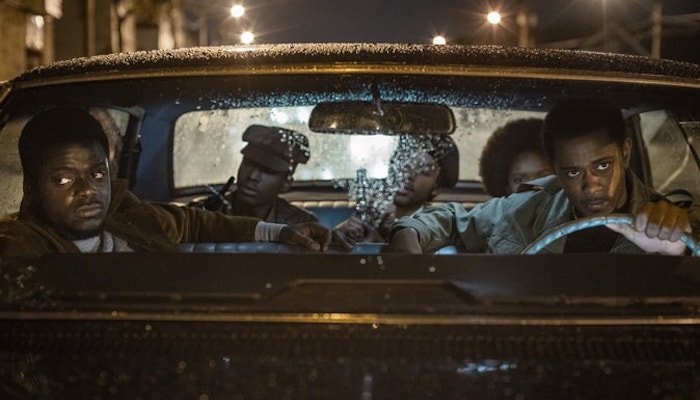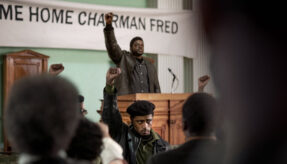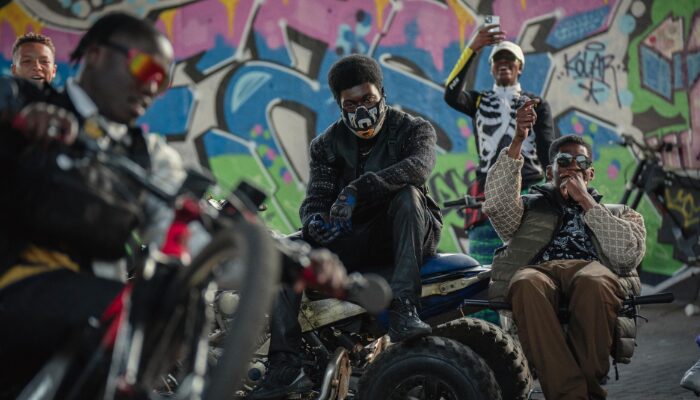Film Review: JUDAS AND THE BLACK MESSIAH (2021): Communism Goes Toe-To-Toe With America’s White Supremacy in Fred Hampton Biopic
Judas and the Black Messiah Review
Judas and the Black Messiah (2021) Film Review, a movie directed by Shaka King, and starring Daniel Kaluuya, Lakeith Stanfield, Jesse Plemons, Dominique Fishback, Ashton Sanders, Algee Smith, Darrell Britt-Gibson, Lil Rel Howery, Dominique Thorne, Martin Sheen, Amari Cheatom, Khris Davis, Ian Duff, Caleb Eberhardt, and Robert Longstreet.
In 1971, just two years after Fred Hampton – the 21-year-old Chairman of the Black Panther Party’s Illinois chapter – was slain in his bed by the CPD and FBI (but two years before anyone knew that the Party’s security director William O’Neal was an informant to the latter organization), the documentarian Howard Alk released his film The Murder of Fred Hampton. The doc is notable for its fly-on-the-wall approach and generally non-invasive view, showcasing the Panthers’ political organizing and their independent investigation following Hampton’s assassination. Alk and co-editor John Mason use the second half of the doc to expertly juxtapose the Panthers’ investigation with the CPD’s own “explanations”, which only stressed the police’s limp, racist justifications even further.
However, what’s particularly noteworthy from the first half of the doc – which focuses on Hampton and the Panthers a year or so before his assassination – is Hampton himself, and his approach to community outreach. One of the early scenes shows Hampton and other Party members sitting around a table and going through a small pamphlet that lays out some of the Party’s upcoming projects. While some of the comrades want more attention placed on the creation of a credit union, Hampton won’t stop asking about the Party’s plans for education – free education, nonetheless. He’s adamant in this point, as doesn’t see financial literacy as a priority unless actual literacy (as well as political literacy) precede it first.
That educational focus makes sense as it’s right in line with Hampton’s own oratory practices. His talks are loud and his language occasionally brash, but that makes them all the more demanding of attention. His promulgation of communist theory to the masses (particularly the teachings of Chairman Mao Zedong) are not the stuffy convolutions of academics but rather straightforward declarations that allow for clear deciphering and room for theoretical expansion. Never does he feign pretension nor inaccessibility. As a result, Hampton eliminates the gatekeeping threshold to the political action sphere, making it a more welcoming arena – nay, a mandatory one – for every citizen. As Hampton frequently reminded his audiences, you can’t have a people’s Party without ceding power to them first. All power to all the people.
This is all to say that Judas and the Black Messiah, Shaka King’s new biopic documenting the months leading up to Hampton’s assassination, takes a similar approach as an edutainment tool. It’s a relatively straightforward film that’s occasionally blunt and shy on formic flair, but through such a set-up King makes its anticapitalist politics and recounting of America’s racist history all the clearer – and still enjoyably accessible cinema for both old comrades and newcomers alike.
Right from the get-go Judas and the Black Messiah espouses Hampton’s (portrayed by Daniel Kaluuya) and the Panthers’ messages in their full-bodied radicalism, with nary a whiff of big-studio dilution. Hampton’s first speech in the film is to a Black student body group at a Chicago college where he emphasizes that capitalism relies on racism to survive, and thus you cannot fight it with Black capitalism (much to the huffy chagrin of some attendees). The film reinforces this ideology by showcasing scenes of community outreach and mutual aid: from traditional canvassing with Party pamphlets, to mornings of their famous free breakfast program. But where the film places a lot of its reenacting weight is on Hampton’s journey throughout Chicago to unify the Black gang The Crowns, the Puerto Rican gang The Young Lords, and the white Southern migrant gang The Young Patriots under the Rainbow Coalition umbrella for joint protection against police violence.
Much like the real Hampton’s insistence on these socialist ideals and fighting oppression through collective action, King never lets the film waver in its moral standing. By doing so, Judas and the Black Messiah also deconstructs the falsehoods of the Black Panthers as being Black supremacists and violent antagonists, instead stressing their beliefs of liberation through unity and armed struggle as a defensive force. As he explains in an interview with GQ, King is steadfast in showing the Panthers as “the heroes of our film” without any elbow room for ambiguity.
Kaluuya pulls off Hampton’s unshakable passion as he moves throughout the film’s space with a collected sense of control. Admittedly he’s a bit on the older side to really embody the Chairman’s youthfulness (Kaluuya was 30-31 while this was in production while Hampton was actually 20-21 during the depicted scenes), but Kaluuya does do justice to Hampton’s fiery dedication. Conversely, Kaluuya highlights Hampton’s inner conflict over Party commitment versus personal preservation quite well through notably reserved actions, mostly whilst quietly confiding in his girlfriend, Deborah Johnson (Dominique Fishback, who brings to the role both a firm tenderness and a spitting resemblance to her real-life counterpart).
However, King and co-writer Will Berson (working off a story developed by the Lucas Brothers, Kenny and Keith) alter the lens through which Hampton’s story is told by angling it toward William “Wild Bill” O’Neal (Lakeith Stanfield). O’Neal, a young car thief and federal agent impersonator, willingly agrees to infiltrate the Panthers’ Chicago chapter for the police and FBI in lieu of a prison sentence for a botched carjacking. Reporting to FBI agent Roy Mitchell (Jesse Plemons), who in turn reports to FBI director J. Edgar Hoover (Martin Sheen, in a slimy and terrifying turn), O’Neal is tasked with getting close to Hampton to better document the Party’s inner functions. O’Neal soon learns that the Bureau doesn’t just want Hampton off the streets but rather off the streets for good, and begins to wonder if his role was to simply incapacitate the party … or for something more sinister altogether.
On the surface, this is a bit of a dubious set-up. In a country that has and continues to profit off the violence perpetrated against African Americans – which itself is just one piece in a world puzzle of capital that demonizes indigenous peoples and left-leaning politics in service of financial interests – it’s a bit odd to view the life of a militant Black communist through the eyes of someone who sold him out to the upholders of white supremacy (the Federal Bureau of Investigation, and the police more broadly) rather than solely through the eyes of said militant Black communist himself. It’s also a bit odd that the filmmakers take the creative liberty to imbue O’Neal with moments of self-doubt before the climax as if to suggest a personal political reckoning, when other critics have pointed out that, historically speaking, that wasn’t really the case. (All that considered, it makes sense why some creators passed on collaborating on this project.)
Yet the cynic in all of us (including director King himself) knows deep down that this set-up is the only way to appease the mega-corporate capital that backs these projects in the first place. No smart capitalist who wants to maintain their socioeconomic power over the masses is going to allow the story of a radical Black communist to be told without a catch or two. And while that’s ultimately a disappointing realization as well as a depressing comment on the state of the entertainment industry (much less the state of the world), it doesn’t diminish the aforementioned dedication of the filmmakers to putting radical Black leftism front and center. It also doesn’t shy away from showing just how insidious American racism really is, from the benign (Mitchell thinking the Panthers and the KKK are one in the same) to the truly dehumanizing (Hoover weaponizing Mitchell’s infant daughter’s white femininity [or the idea of it] to flame segregationist fears).
But this compromised set-up also accentuates the deep-seeded tragedy at the heart of the narrative: O’Neal’s ultimate cold indifference to Black and working-class suffering, and his opting for personal triumph over collective action for the community.
Stanfield, arguably one of the best and nearly non-stop working actors of the past decade, brings the versatility from his recent genre films to complicate an otherwise shallow character. Stanfield imbues O’Neal with enough charisma to manipulate those around him in a near-flawless manner, but also enough fear that leaks through his cracks and makes his charade all the more evident to those in the know. Even earlier on when we think O’Neal might be having a change of heart, such as a guilt-ridden dream seemingly spurring the suggestion of a bullheaded bombing plot, the rug is pulled out from under us when he angrily drives away after being rejected by Hampton and tears the microphone out from under his shirt. It’s a performance within a performance that further enforces O’Neal’s own selfish endgame, and Stanfield handles that layered whiplash with skilled panache.
Hampton offers a material liberation through a spiritual one, whereas O’Neal is only concerned with the first half. The tragedy of Judas and the Black Messiah is not just over the loss of Hampton as a political leader, but over the non-existence of O’Neal’s conscience … an irredeemably lost soul.
With this film, King offers up a searing portrayal of American history that attempts to right the wrongs of our textbooks and our collective psyches. Following in the footsteps of Spike Lee’s magnificent epic Malcolm X (which itself is possibly just as relevant when it comes to the U.S. government’s interference in leftist politics), Judas and the Black Messiah is a bold account of one’s potential cut tragically short while leaving a radicalizing reverberation in its wake. It’s far from straight-up Marx, but this may be the best synthesis of communist ideals with popular entertainment that you’ve seen in a while. One can only wish that we’ll learn from the past, though, and hope that this won’t be the last instance of it by a long shot.
Rating: 8/10
Leave your thoughts on this Judas and the Black Messiah review and the film below in the comments section. Readers seeking to support this type of content can visit our Patreon Page and become one of FilmBook’s patrons. Readers seeking more film reviews can visit our Movie Review Page and our Movie Review Pinterest Page. Want up-to-the-minute notifications? FilmBook staff members publish articles by Email, Twitter, Instagram, Tumblr, Pinterest, and Flipboard.
Related Articles
FilmBook's Newsletter
Subscribe to FilmBook’s Daily Newsletter for the latest news!







